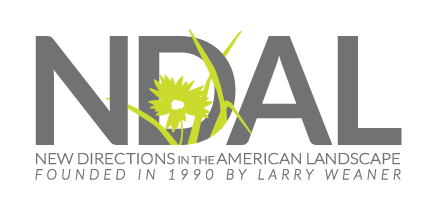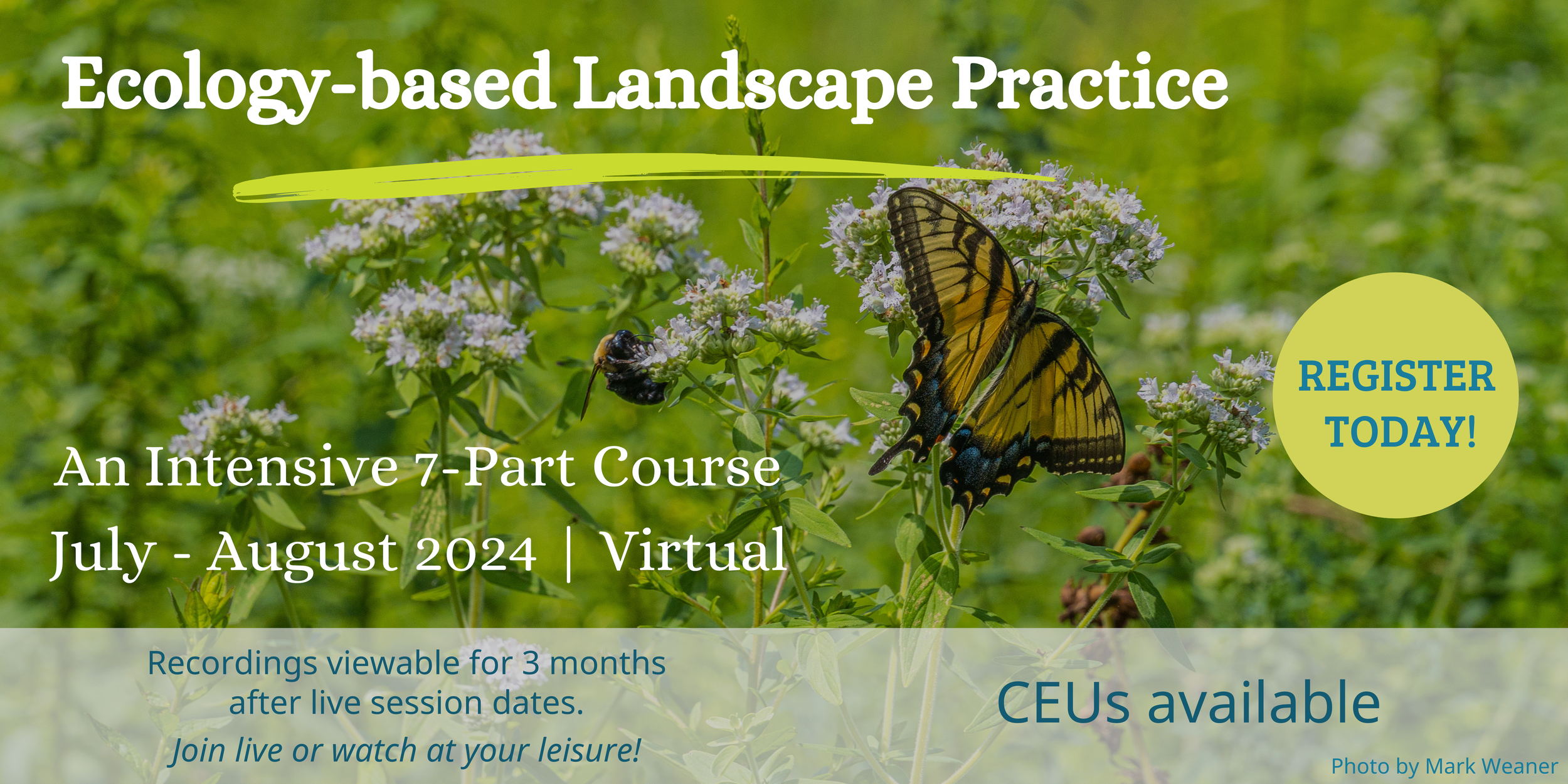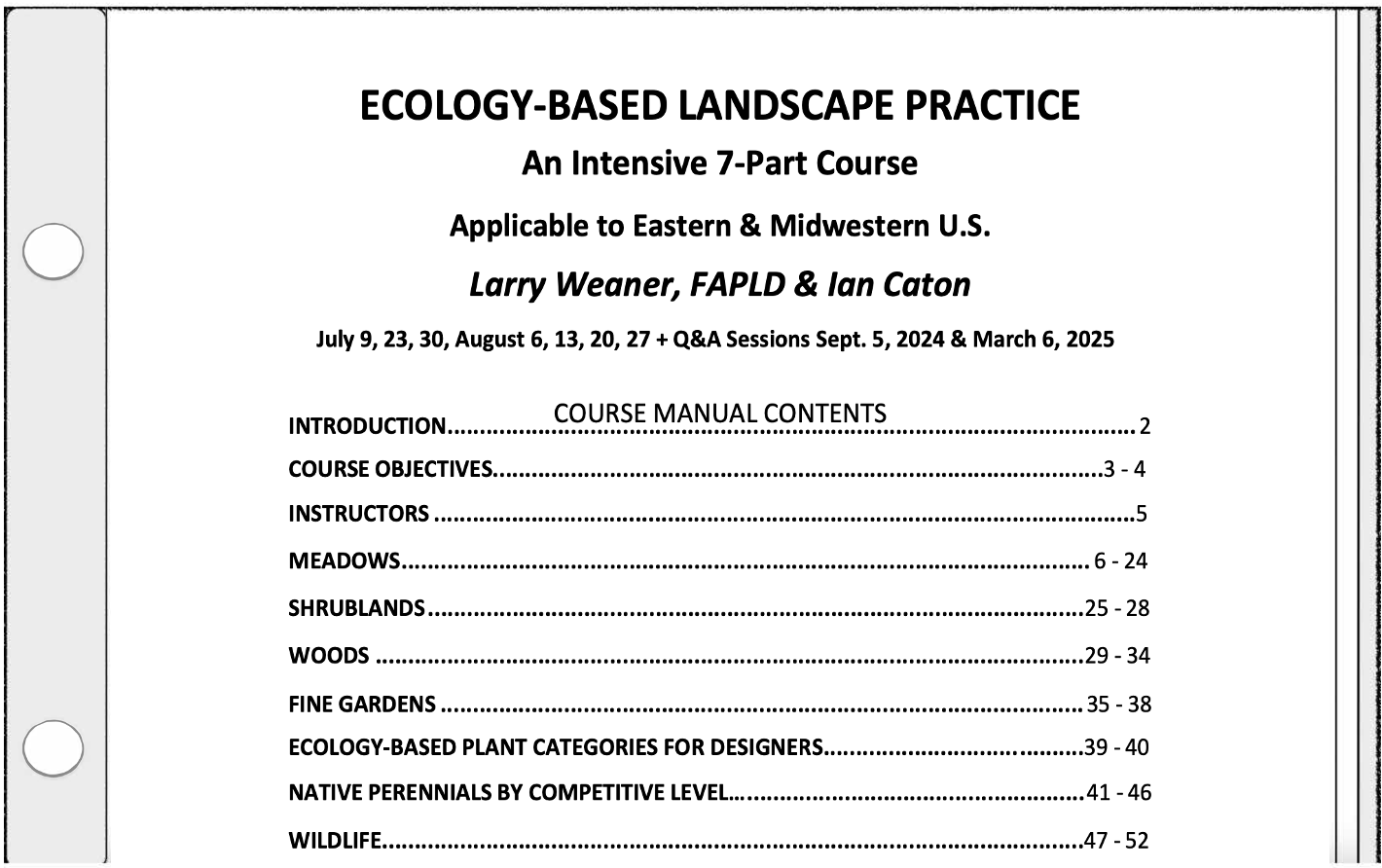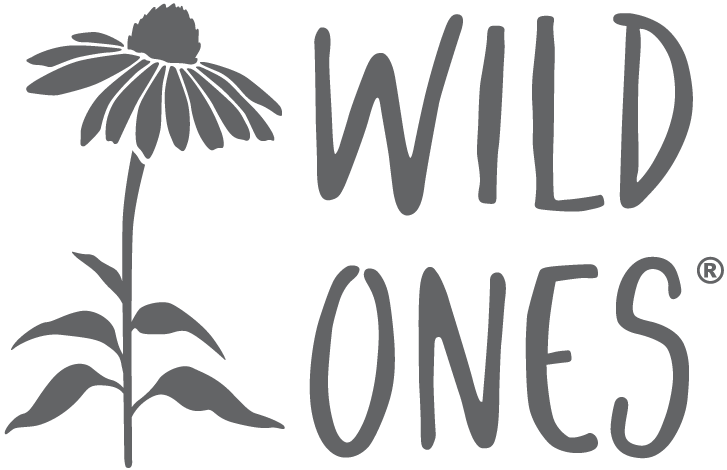Where science meets practice
Join Landscape Designer Larry Weaner and native plant expert Ian Caton on a deep dive into the integration of restoration ecology and garden design. From technical instruction to personal anecdotes, Larry and Ian will share over 70 years of combined experience on the fine points of designing, planting, and managing ecology-based landscapes. Participants will have the opportunity to compare notes and interact with instructors during two post-program conversational sessions.
Geared toward landscape practitioners in the Eastern & Midwestern U.S.
Attendees will receive a 100+ page login-protected course manual including an ecology-based plant characteristics chart, equipment recommendations, wildlife habitat enhancement strategies, diagrams for planting and maintenance procedures, and more.
Register for the Full Bundle (Sessions 1-7) - $645
(Full Bundle now closed - check out our Feb-Mar 2025 Intensive!)
or individual sessions - $135 each
or scroll down for session details
Registration is open and recordings are viewable for 3 months after each live session date - join live or watch at your leisure!
CEUs available - 21 class hours (LA CES) plus two 2-hour Conversation and Q&A sessions (25 hrs - APLD, NOFA, SER)
See here for CEU details and instructions.
Student scholarships & discounts available! Scroll down below the session descriptions for details.
“You have made a great contribution to the field through your conferences.”
– Leslie Sauer, Andropogon Associates, Philadelphia, PA

The Artistic Overlay: Making “Wild” Legible (Virtual Intensive Session 7 of 7)
Instructor: Larry Weaner, FAPLD
Ecological design need not be a bitter aesthetic pill that our clients must swallow to do the right thing. The order inherent in our wild native landscapes is widely considered beautiful. By translating that ecology-based order into the aesthetically-based language of fine garden design, the results can be much more universally embraced by our clients. In addition, Larry will illustrate how highly gardenesque - and even formal - elements can gracefully interact and intermingle with wilder woodland, shrubland, and meadow compositions. This approach can result in landscapes that are both ecologically productive and visually pleasing to clients with a variety of aesthetic preferences.
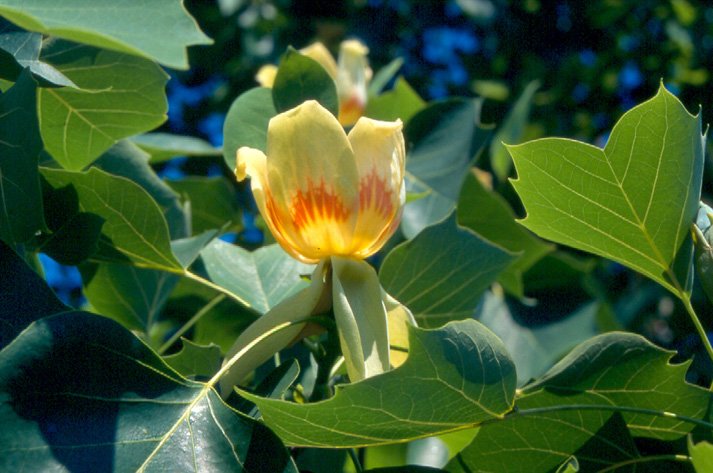
Plants of the Canopied Landscape: Woodlands, Edges, & Hedgerows (Virtual Intensive Session 6 of 7)
Instructor: Ian Caton
In this session, native plant authority Ian Caton will examine plants of the canopied landscape that exemplify the ecological characteristics described by Larry Weaner in previous sessions. His presentation will include plants found at all of the woodland’s vertical layers, from canopy to understory. He will also discuss their specific abilities to integrate with the unique colonization strategies inherent in woodland development and enhancement. Finally, Ian will present a group of “workhorse” native species for the woodland, including those that combine reliability with desirable aesthetic characteristics.

The Canopied Landscape: Woodlands, Edges, & Hedgerows (Virtual Intensive Session 5 of 7)
Instructor: Larry Weaner, FAPLD
An ecology-based approach to woodland design is more like guiding a vegetative process than implementing a static planting plan. Guided succession can foster the orderly transformation from an open field to a multi-tiered forest through planting, managed natural recruitment, or a combination of the two. Under existing canopy, where few herbaceous species can be established through direct seeding, we will discuss the planting of small “seed source colonies,” and management strategies to encourage their proliferation into the larger landscape. Management techniques that are unique to woodlands including selective height cutting, sunlight manipulation, and assisted seed dispersal, will also be described in detail.

Plants of the Open Landscape: Meadows, Old Fields, & Shrublands (Virtual Intensive Session 4 of 7)
Instructor: Ian Caton
In this session, native plant authority Ian Caton will examine plants of the open landscape that exemplify the ecological characteristics described by Larry Weaner in previous sessions. His presentation will span the successional period from herbaceous meadow, to mixed woody/ herbaceous old field, to the ecologically important but often neglected clonal shrub thicket. He will also present a group of “workhorse” native species for the sunlit landscape that combine reliability and weed suppression with attractive aesthetic character.

The Open Landscape: Meadows, Old Fields, & Shrublands (Virtual Intensive Session 3 of 7)
Instructor: Larry Weaner, FAPLD
Wildflower meadows and native grasslands are in high demand, but effective protocols for successfully achieving them are in short supply. Here we will delve into the nitty gritty of meadow design: site analysis, species selection, seed mix formulation, live plant inclusion, planting and management. The inclusion of shrub thickets and drifts will also be covered, including the arrangement of clonal vs. clump forming species, and the use of shrublands as ecological and visual “connective tissue” between meadow and woods.

Ecology-based Design | Recording (Virtual Intensive Session 2 of 7)
Instructor: Larry Weaner, FAPLD
*Recommended prerequisite for all other Sessions
Larry will expand upon the ecological principles described in Session 1 by illustrating them in the context of landscape plans, planting protocols, and management procedures. He will also describe often-neglected plant characteristics that are crucial to ecology-based practice. These will include habitat fidelity, colonization patterns, seasonal growth period, life spans, spatial and temporal niche, and proliferation strategies.
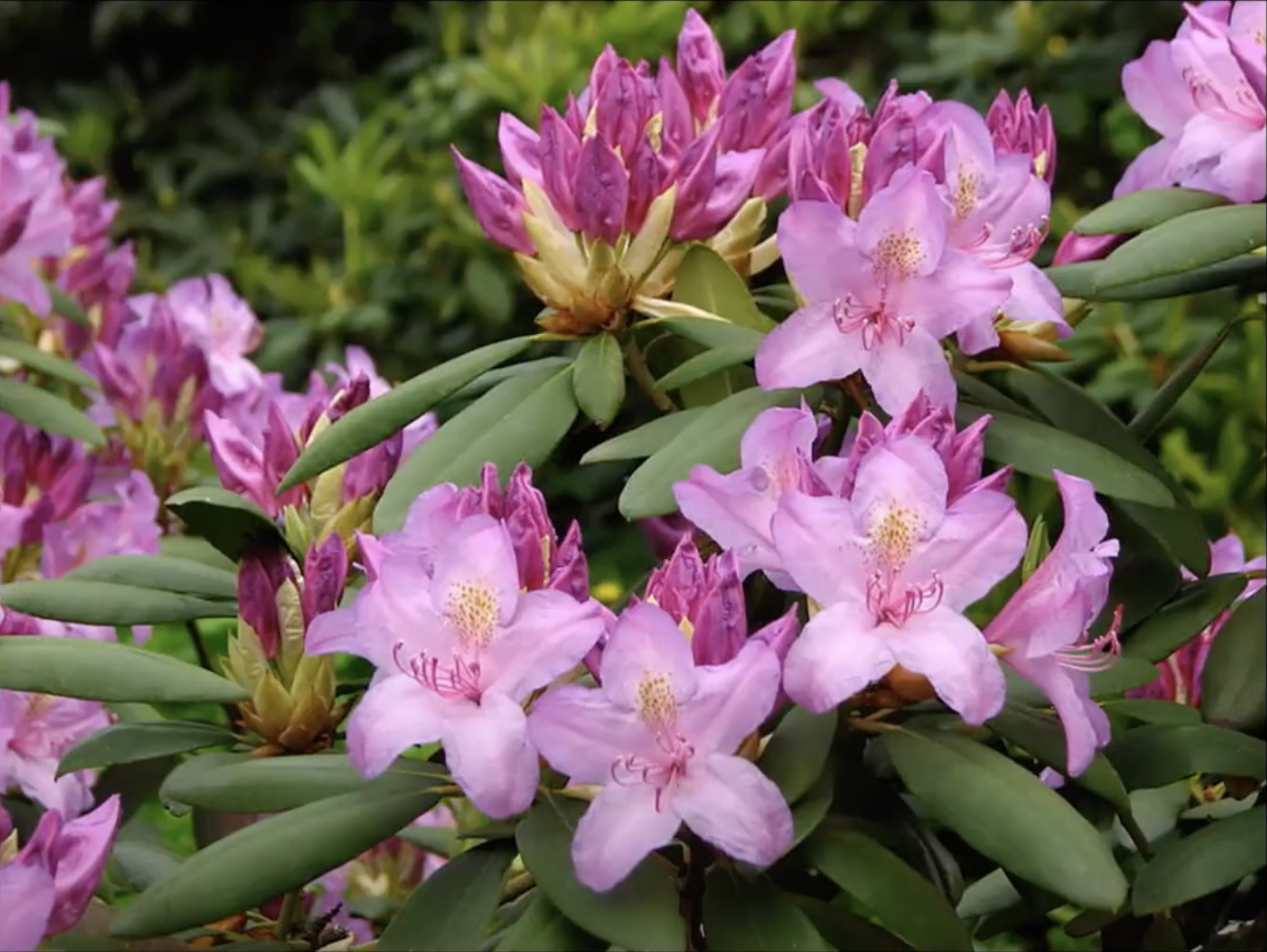
Foundational Ecological Principles | Recording (Virtual Intensive Session 1 of 7)
Instructor: Larry Weaner, FAPLD
*Recommended prerequisite for all other Sessions
Our opening presentation will examine the species traits, vegetative patterns, and ecological processes found in spontaneous plant communities. The patterns and processes explored will include disturbance, succession, competition, and relative ecological stability. This session will serve as the theoretical basis for the practical design, planting, and management procedures detailed in all subsequent sessions.
INCLUDED FOR ALL REGISTRANTS:
Two Conversation and Q&A Sessions
Larry Weaner & Ian Caton
These conversation-style sessions will be entirely devoted to questions and comments from participants. The first will be held soon after the last session while the information is still fresh in participants’ minds. The six-month gap between Q&A sessions will allow participants time to apply the course content, and return with questions or insights for presenters and fellow participants.
First Q&A Session: Thursday, September 5, 2024 | 2:00 - 4:00 PM ET
Second Q&A Session: Thursday, March 6, 2025 | 2:00 - 4:00 PM ET
Instructor Bios
-
Ian Caton worked for Larry Weaner Landscape Associates from 2001 to 2013, and now serves as a project consultant for the firm. His knowledge of native plants and their characteristics is encyclopedic. He is also the founding principal of Wood Thrush Native Nursery in Floyd, VA. Ian has designed and installed landscapes for a wide range of residential, commercial, and public settings. Prior speaking engagements include the Irvine Native Plant Symposium and events at the New York Botanical Garden and Bowman’s Hill Wildflower Preserve.
-
Larry Weaner, FAPLD, president and founder of Larry Weaner Landscape Associates, established New Directions in the American Landscape in 1990. He is nationally recognized for combining expertise in horticulture, landscape design, and ecological restoration. His design and restoration work spans more than twenty U.S. states and the U.K., and has been profiled in national publications, including The New York Times, The Wall Street Journal, Landscape Architecture Magazine, Garden Design, American Gardener, Wildflower Magazine, and ASLA’s “The Dirt” blog. Larry has presented at American Society of Landscape Architects (ASLA) annual and state chapter meetings, Association of Professional Landscape Designers (APLD) events, and many others. His book, Garden Revolution: How Our Landscapes Can Be a Source of Environmental Change (Timber Press 2016) received an American Horticultural Society (AHS) Book Award in 2017. In 2021 he received the AHS Landscape Design Award and the APLD Award of Distinction.
Photo by Larry Weaner Landscape Associates
What past Intensive Course attendees are saying:
“Totally fantastic! No other presentations come close to NDAL events in terms of quality and richness of information.”
“Great depth of plant knowledge and content that can be directly applied into practice!”
“Amazing! Mind-blowing stuff. So pleased with the specificity of information and the fact that Larry is willing to share this wealth of knowledge.”
“Ian was really well-spoken and incredibly knowledgeable!”
Registration & NDAL Participants Portal
Wild Ones member discount: If you have already emailed your member status verification for a previous course, please look out for our email sending the new code for this Intensive Course. If you have not yet, please email verification of member status to info@ndal.org for discount code.
When registering on the NDAL Participants Portal you will be asked to either sign into your existing account or create one. This account will give you exclusive access to the session recordings and course materials. These materials will be available until three (3) months after the live event dates.
Group Orders: To register multiple people/staff members at once, click Register, then enter the number of registrations needed under Quantity on the left side. You will receive an email with an invite link to send to all the registrants in your group. Please note if you are registering yourself as well, you will not be automatically registered under a Group Order; you will also need to click the invite link to redeem your registration.
Gift Orders: To purchase a course as a gift for someone else, click Register, then check off “This is a gift.”
Registration will be refunded only if notification is received before five (5) working days prior to the live event date less a $10 processing fee.
Student Scholarships | Free Attendance
Students and recent graduates are invited to apply for scholarships granting free registration to the Intensive Course. Limited number of scholarships available.
To apply: Send your resume and 1 page (maximum) letter expressing why you’d find value in attending this program.
Student Discounts
Please send your verification of student status to info@ndal.org for a student discount. Thank you for your interest!
Thank you to our Institutional Ally:
Sponsorships Available
Reach landscape professionals including landscape designers, landscape architects, horticulturists, and restoration ecologists by sponsoring our 7-part Intensive Virtual Course.
Questions? Please contact:
info@ndal.org
510-518-0430
